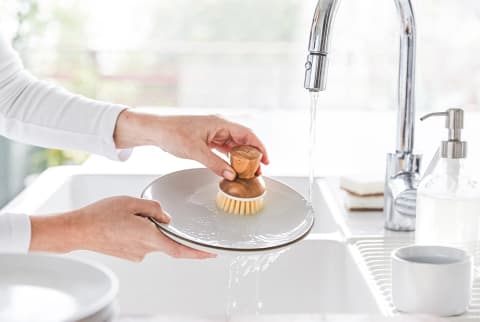The Best Way To Clean Your Dishes With & Without A Dishwasher


Along with a full belly and a full refrigerator, Thanksgiving also means a full sink of dishes. Even the cleanest of us all could use a few pointers when it comes to this kitchen chore, so we asked Peter Miller, author of How To Wash the Dishes, for his top tips for cleaning plates fast—with and without a dishwasher.
Advertisement
With a dishwasher:
Keep single items out of the dishwasher.
According to Miller, the most important thing to keep in mind when using a dishwasher is to keep single items out, such as pans, strainers, whisks, serving spoons, and so on.
Even things like rubber spatulas and knives, he says, should be left out, as their handles take up room, and knives can be dangerous (to your hands and your dishes). In short, save your dishwasher for things like cutlery, plates and bowls, and glasses.
Advertisement
Always rinse.
To pre-rinse or not to pre-rinse? According to Miller, that's actually not the question. "No dishwasher, no matter the brand, can handle too much debris," he explains, so always rinse dishes beforehand.
Load your dishwasher strategically.
With your rinsed dishes, Miller advises loading up the dishwasher "like a cabinet, not like the back end of a pickup." Not only will keeping things organized help you optimize the space in your dishwasher, but it makes the whole process safer for your dishes.
Advertisement
Wash the rest by hand.
You'll want to wash the items you leave out of the dishwasher by hand after the machine is up and running. "Keep the pans aside with the whisk, strainer, etc., and do them at the end by hand," Miller suggests.
He adds that materials like cast iron and steel also need to be tended to by hand, as they need the extra attention, they would take up too much room in the dishwasher, and they're a threat to glassware.
Without a dishwasher:
Rinse first in a stainless-steel bowl.
When washing dishes in the sink, Miller recommends filling a stainless-steel bowl with a quality soap and water for a prewash rinse station. "When you are muddy, you do not jump right in the tub—you rinse," he explains of this step.
Miller adds the bowl should be no bigger than half your sink, so you still have additional sink room to work with. Keep the soapy water fresh and change it as needed, he adds.
Advertisement
Keep a separate bowl for cutlery.
Now, with that rinsing bowl in mind, Miller notes you'll want a separate bowl for things like sharp knives and other cutlery. After all, you don't want to stick your hand in murky water and cut yourself. Allow your cutlery to soak while you tackle the larger dishes.
Save big items to wash by themselves.
Depending on how big your kitchen space is, you may need to get creative with where you're putting dishes. "Remember, a big sauté skillet cannot sit in the sink and have you work around it. Do it by itself, and if you have to, set the big pans on the floor on a clean rug after washing them," he says.
Overall, he says, the idea is to keep your "runway," or cleaning space, as clear and open as possible to streamline the process.
Advertisement
Consider opting for a dishcloth rather than a sponge.
And lastly, if your dish cleaning tool of choice is a sponge, Miller says you may want to opt for a dishcloth instead. "The Swedes and Kiwis and Japanese all use a dishcloth to wash," he explains, adding that the beloved tool won't develop funky odors and can be easily rinsed.
If a sponge is your only option at the moment, though, he suggests frequently rinsing it with cold water to help keep bacteria at bay.
The bottom line.
With great Thanksgiving food comes a great amount of dishes, and it never hurts to have a few helpful tricks up your sleeve at the sink. With this guide, a clean kitchen will be yet another thing to be grateful for this holiday.

Sarah Regan is a Spirituality & Relationships Editor, a registered yoga instructor, and an avid astrologer and tarot reader. She received her bachelor's in broadcasting and mass communication from State University of New York at Oswego, and lives in Buffalo, New York.
